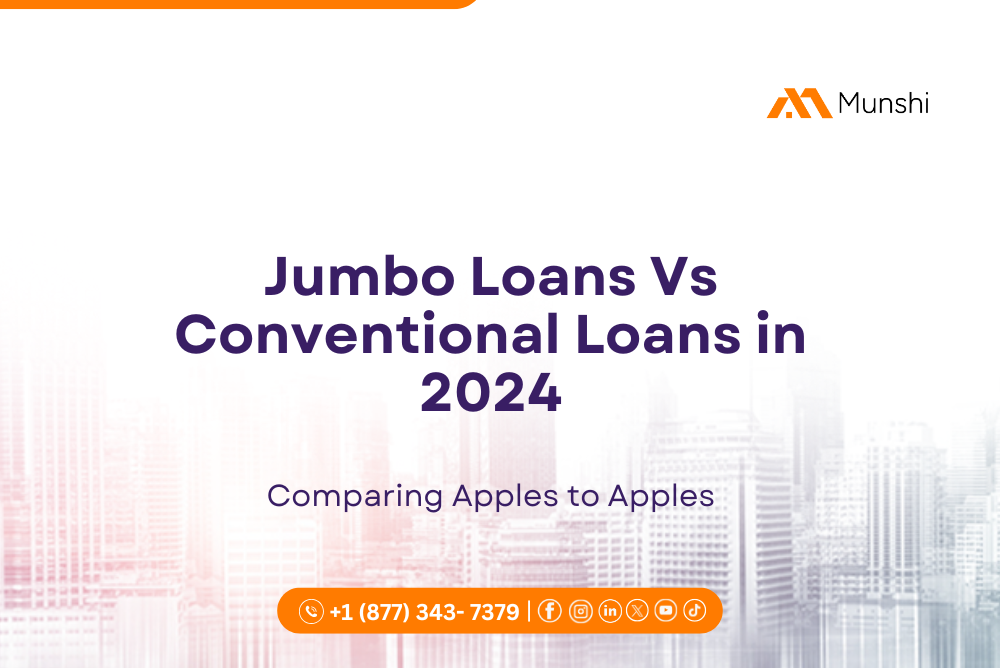Many investors solely depend on financing tools and solutions to help them buy a home. Hence, scoring a successful mortgage deal is a key step towards owning a home. Investors have a free range of choices regarding loans in 2024, namely jumbo and conventional loans. This blog will elaborate on what they both offer, how they stand up to each other, and which scenarios they are suited towards.
While this article will help you distinguish between these two lending options, the real estate realm is expansive and has many facets.
Basic Definitions
Jumbo Loans
Mortgages, known as jumbo loans, offer money beyond the traditional limits set by Government-Sponsored Enterprises like Freddie Mac and Fannie Mae. These limiters help regulate the mortgage market and make affordable housing a reality for many investors and homeowners. As of 2024, any loan offering over $650,200 is considered a jumbo loan.
Conventional Loans
Meanwhile, conventional loans are the ones that offer amounts within the brackets set by entities like Freddie Mac and Fannie Mae. As of 2024, any loan offering a sum below $650,200 can be categorized as a conventional loan. However, this amount may vary depending on the property type and its geographical location.
Major Differences
Loan Limits
The predominant difference between conventional and jumbo loans sits with the loan limits. While jumbo loans allow investors to borrow a sum above the limits set by government-sponsored entities, conventional loans do not cross that lending threshold.
Interest Rates
The cost of a mortgage heavily depends on the rate of interest. Typically, jumbo loans have been known to demand a slightly higher rate of interest when compared to conventional options. The lender is at a greater risk because of the large amount being given out, which leaves them open to a large loss if the borrower defaults.
Credit Requirements
Creditworthiness is important while seeking loan approvals, be it jumbo or traditional loans. While both variants have different credit score requirements, the ones associated with jumbo loans are quite stringent. These norms highlight the increased risk taken by the lender. Traditional loans also scrutinize credit scores but are way more lenient.
Down Payment
A down payment is a cost associated with almost every loan type. Due to the maximized risk of lending out greater amounts, jumbo loans often mandate a much higher down payment percentage. This typically ranges between 10%-20%, and it may vary with lenders. However, in the case of conventional loans, some options can offer down payment percentages as low as 3.5%.
Pros and Cons
Jumbo Loans
Pros:
- Access to High-Value Properties: Jumbo loans unlock the ability for investors to chase high-value homes that may be located in posh areas or feature unique aspects.
- Flexibility: Due to the extensive amount that can be lent out, investors can choose from a wider variety of homes without worrying about the loan amount.
Cons:
- Higher Interest Rates: As stated, the elevated risk taken by the lender in giving out large amounts results in a higher asking rate. This raises the overall cost of property acquisition.
- Strict Requirements: Financial and credit requirements for jumbo loans are quite steep, and they ask for a higher credit score, flawless repayment history, income source, etc.
Conventional Loans
Pros
- Lower Interest Rates: Conventional loans ask for a considerably lower interest rate, lowering the overall homeownership cost. This also leads to reasonably priced monthly installments.
- Wider Accessibility: Investors with moderately positive or even average credit scores can apply, thus widening the range of borrowers.
Cons
- Limited Loan Amounts: Traditional loans can only give out a certain amount of money to a borrower, and this number is pre-decided by GSEs like Freddie Mac and Fannie Mae. This makes conventional loans ill-suited for high-value homes.
- Stringent Down Payment Norms: While conventional loans have very low down payment requirements, the typical percentage is 20% for investors who want to avoid paying for Private Mortgage Insurance (PMI).
Making the Right Choice
Opting for a jumbo or conventional loan in 2024 requires carefully calculating your financial scenario, property ownership goals, and the regional real estate market.
Property Value
- Going for a jumbo loan is the only viable option if the property price exceeds conventional loan limits.
- However, if the price is well within the ranges set by GSEs, going for conventional loans will offer cheaper ownership costs.
Creditworthiness
- You will need a flawless report and above-average credit score to qualify for a jumbo loan. Having better than most results will also allow you to score favorable terms.
- Investors with more diverse credit reports are better suited for conventional loans.
Down Payment Capability
- If your financial scenario allows you to make the necessary down payment to qualify for a jumbo loan, then you should definitely go for it. This will unlock the ability to go for high-value assets and widen your choice.
- If you are particularly seeking low down payment options, conventional loans have quite a few options to browse through.
Long-Term Financial Plan
- If your financial scenario allows you to make the necessary down payment to qualify for a jumbo loan, then you should go for it. This will unlock the ability to go for high-value assets and widen your choice.
- Conventional loans have several options to browse through if you are particularly seeking low down payment options.
Conclusion
Your unique preferences and circumstances shape your choice while opting between jumbo and traditional loans. While both options have their ups and downs, a rigorous evaluation of your financial health, wealth creation goals, and regional market trends is invaluable.
Before taking the leap, and making your decision about Jumbo loan or conventional loan, you must consult real estate professionals like the Amish Munshi team. They have been at it for quite some time and are the reason behind many success stories.





